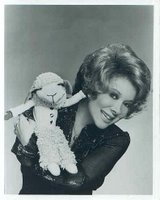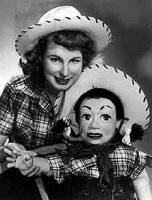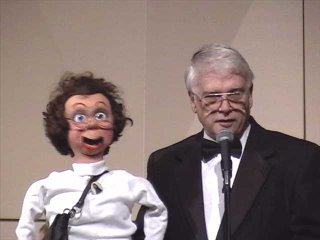Jokes About Ventriloquists
The first joke is the one virtually everyone tells when they want to needle a ventriloquist. They say, “Which one is the dummy?” That's it. Original, ain't it? Hilarious, too.
The other six jokes keep showing up on the Internet. Non-ventriloquists tell them, and ventriloquists cast a weary eye skyward and shrug it off. If you haven't heard them, they might amuse you, and you may tell them to non-ventriloquists. But be aware that every other ventriloquist has heard them countless times.
Here they are.
The Topless Ventriloquist
Did you hear the one about the topless lady ventriloquist? No one noticed whether her lips were moving.The Drunk and the Ventriloquist
A ventriloquist is performing in a bar where a drunk continuously heckles him. The dummy fires snappy comebacks at the drunk in response to every heckle. The drunk takes offense and yells up to the stage, “You do that one more time and I'll punch you in the nose!”The ventriloquist ignores the threat, and when the drunk heckles the act again, the dummy fires another retort. The drunk gets out of his chair and storms the stage, saying, “I told you what I'd do, now I'm gonna do it!”
The ventriloquist, visibly shaken, says to the drunk, “I'm sorry sir, it's just a part of the act, it won't happen again.”
The drunk glares at the ventriloquist and responds, “You keep outta this, fella, my beef is with the little guy on your lap.”
The joke just told has several versions, and has even been the subject of cartoons. A recent version of the joke substitutes a blonde for the drunk. Others use cowboys, hillbillies, and bikers. According to Jimmy Nelson the story actually happened to him in a joint in Buffalo, NY. Russo Louis also tells a version of this story from his performing experience.
The Ventriloquist and the Farmer
A ventriloquist visits his uncle's farm. The uncle, who doesn't know his city born nephew is a ventriloquist, shows the lad around the farm. They come to the chicken coop and the nephew asks, “Uncle, what are those birds?”“They're chickens,” the uncle answers.
“Can chickens talk?” asks the nephew.
“No, Nephew, chickens can't talk.”
“Let's see,” says the ventriloquist, “Hi there, Mrs. Chicken, how do you like life here on the farm?”
The ventriloquist throws his voice into the chicken coop and makes the chicken answer, “Well it's just fine. We have a nice roost and the feed is plentiful and tasty.”
The uncle is astounded. He'd never heard a chicken talk before. They move on and the nephew asks, “Uncle, what is that large animal over there?”
“Why that's a cow,” comes the reply.
“Can cows talk?”
“No, I was wrong about the chickens, but I'm sure the cow can't talk.”
The nephew addresses the cow, “Hello Mrs. Cow, how do you like it here on the farm?”
The ventriloquist makes the cow respond, “Oh, it's nice. We have good grazing pasture and a nice stall to sleep in.”
The uncle is even more astounded. “Well, that’s one on me, I never heard a cow talk either.”
The nephew points to a nearby hill. “Uncle, what are those white, furry creatures up there grazing on the hill?”
The uncle quickly replies, “Nephew, those are the lyin'est damned sheep you ever met in your life!”
The Rat and the Canary
A guy goes into a bar and says to the bartender, “Say, if I show you a good trick will you give me a free drink?”“Depends on the trick,” says the bartender.
The guy pulls a tiny piano and bench out of his coat pocket. He reaches in another pocket and pulls out a rat. He sits the rat on the bench and the rat begins playing “Stormy Weather” on the piano.
“That's a great trick,” says the bartender. “Have a drink on me.”
The guy finishes his drink and says, “Say if I show you a trick, will you give me another drink?”
The bartender answers, “If it's the rat trick, I've already seen it.”
“No,” says the guy, “It's different. I've added to the trick.” With that he pulls a canary out of his pocket and sits the canary on top of the piano. The canary begins singing “Blue Moon” while the rat accompanies her on the piano.
“Great trick,” says the bartender. “Have another drink.”
About that time another patron slides down toward the guy with the trick. He says, “I see you're down on your luck. Would you consider selling that trick for a hundred bucks?”
“Sure,” says the guy. “ I could use a hundred bucks.” And he takes the man's money and gives him the piano, bench, rat and canary.
The man leaves taking the trick with him, and the bartender says to the guy, “I don't want to tell you your business, but you just got taken. That trick is worth a whole lot more than a hundred bucks.”
“Nah,” says the guy. “The trick's a fake. That canary can't sing. The rat's a ventriloquist.”
The Ventriloquist Medium
A ventriloquist, down on his luck, sets up a business as a spiritualist, using his ventriloquial skills to trick clients into believing they could converse with their departed loved ones.On his first day in business a matronly lady comes in and asks to speak with her dead husband. After a half hour of back and forth between the lady and the ventriloquist's simulation of her husband's voice, the séance is over, and the lady pays the ventriloquist his fee. She is so impressed that she adds a fifty dollar tip. Then she asks, “Would it be possible for me to return next week for more discussions with my husband?”
“Madam,” the ventriloquist answers, “for a tip like this, you can converse with your husband while I'm drinking a glass of water.”
The Ventriloquist and the Talking Dog
A ventriloquist and his dog stop in a bar. The ventriloquist orders a beer and then the dog seems to say to the bartender, “And I'd like a pan of water.”The bartender, not realizing his customer is a ventriloquist, is amazed to see a talking dog. He offers the ventriloquist a substantial sum for the dog, which the ventriloquist accepts. As the ventriloquist leaves with the money, the dog seems to say, “How dare you sell me and leave me here after my years of loyalty and service? Just for that, I shall never speak another word as long as I live!”
So there you have it. Those are the jokes about ventriloquists. I hope you enjoyed them. Now forget about them.
















